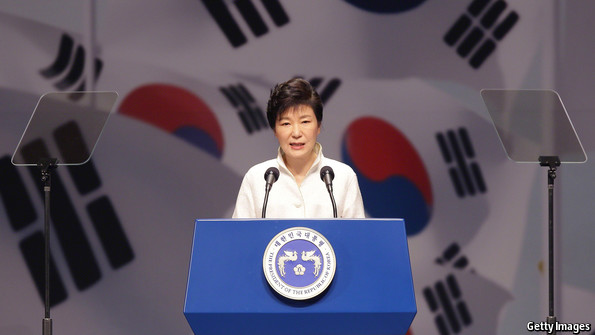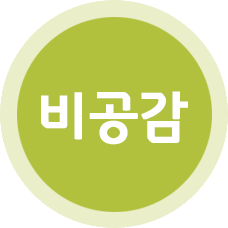
IN THE dog days of August, Japan and one of its former colonies, South Korea, mark a string of painful anniversaries. The culmination must be for the end of the second world war every August 15th, which is celebrated as “Liberation Day” by the Koreans. The occasion is often the trigger for a bout of midsummer mudslinging across the Japan Sea. This year has been no exception.
Twice this week, prosecutors in Seoul have summoned Tatsuya Kato, the bureau chief of Japan’s Sankei newspaper, to ask about accusations that he defamed Park Geun-hye, the nation’s president (pictured above). While they mull charging Mr Kato, he is banned from leaving South Korea. Japan’s embassy has called the actions against him regrettable, “from the viewpoint of freedom of the press as well as from the viewpoint of Japan-Korean relations in general.”
Mr Kato landed himself in trouble by writing about speculation as to the whereabouts of Ms Park on April 16th, when her country was struggling to deal with the sinking of the Sewolferry. The disaster killed almost 300 people, mostly high school students. Ms Park was handling the aftermath badly, Mr Kato seemed to imply, because she had gone off for a tryst with a recently divorced man.
His article ran online on August 3rd. It said that Ms Park’s advisers had no idea of her whereabouts for seven hours, and quoted other reports to the effect that she was at an “undisclosed location” with the man in question. Ms Park’s office has denied the gossip to which he referred and insists she was at her post inside the presidential compound.
To deny it is one thing. The accusation of libel though has left many analysts scratching their heads. After all in his article Mr Kato’s was careful to quote only South Korean sources, including the conservative Chosun Ilbo newspaper and on-the-record comments that were made by Ms Park's chief secretary during proceedings of the national assembly. Someone who works at the Sankei said they were puzzled by prosecutors' interest in their case, but then offered a possible explanation: “The South Korean government hates us.”
The Sankei is a right-wing paper that has spent years campaigning to reverse a landmark apology that was made on behalf of Japan in 1993. The apology acknowledged that during the war Japan had forced thousands of Korean women into military brothels; the victims have become known as “comfort women”. But many conservative politicians in Japan prefer to label the women wartime prostitutes, which infuriates South Koreans and corrodes diplomatic ties between the two countries. The Sankei is a notable forum for their views.
Whatever the prosecutors’ reason, the spat illustrates how public discussion on both sides of the sea spirals into tit-for-tat nationalist bickering, says Takaaki Mizuno, a former Washington correspondent with the Asahi newspaper. He says the Japanese media has become “more shallow and one-dimensional” under Shinzo Abe, the current prime minister. But he laments that South Korea’s campaign against the Sankei has stoked the fury of the newspaper’s supporters, who have reacted with predictable outrage.
This week conservative scholars and commentators in the Japanese media have condemned the attack on free speech and warned that South Korea’s international image will suffer as a result. Some TV pundits have even compared the campaign against the Japanese newspaper to the antics of the Stalinist North Korean regime headquartered 60 miles north of Seoul.
Ms Park’s office appears to be in no mood to pull in the prosecutors' horns. Yoon Doo-hyun, the president’s head of public relations, has threatened “grave action” against the Sankei. Yun Byung-se, South Korea’s foreign minister, brought up the offending article in a meeting with Fumio Kishida, his Japanese counterpart, at an ASEAN Regional Forum in Myanmar. Mr Yun asked Mr Kishida to use his “political influence” to help both countries exit from a “dark tunnel” of soured relations. It was unclear if he was calling for the government to lean on the Sankei—or what else he expected might make things better.


 글쓰기
글쓰기